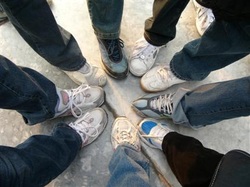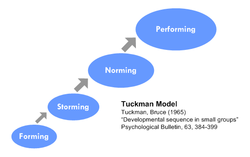Partner & Group Work

One of the greatest lessons I learned from my first online course is that even though you have to complete assignments with partners and team members online, your partners and team members are still people!
You will work with a partner to design an online course.
You will work with your team to moderate an online discussion and build an online resource for educators.
The key is that the focus of both of these activities is online communication BUT when working with your team, you still have to build rapport and establish how you will best work together, even though you are primarily communicating electronically.
You will work with a partner to design an online course.
You will work with your team to moderate an online discussion and build an online resource for educators.
The key is that the focus of both of these activities is online communication BUT when working with your team, you still have to build rapport and establish how you will best work together, even though you are primarily communicating electronically.
Stages of Group Development

While I had learned this many years ago, I discovered that Tuckman's Stages of Group Development still apply in group work that is conducted online:
1. Forming - the group is getting to know each other and avoiding conflict with each other.
2. Storming - group members have differing ideas on how to approach the project and some confrontation may occur.
3. Norming - a plan is formed and some compromise is necessary to promote the work of the team.
4. Performing - the work gets completed and is able to make decisions in the best interest of the project and team.
Being aware of the group dynamics will help you identify how to move effectively through the stages and not spend too much time forming and storming.
Source: http://managementhelp.org/groups/dynamics-theories.htm
1. Forming - the group is getting to know each other and avoiding conflict with each other.
2. Storming - group members have differing ideas on how to approach the project and some confrontation may occur.
3. Norming - a plan is formed and some compromise is necessary to promote the work of the team.
4. Performing - the work gets completed and is able to make decisions in the best interest of the project and team.
Being aware of the group dynamics will help you identify how to move effectively through the stages and not spend too much time forming and storming.
Source: http://managementhelp.org/groups/dynamics-theories.htm
Building Relationships and Participating in Group Projects Online

Had I known these tips before I taken the course, I would have saved myself and teammates a great deal of time! Piskurich (2004) advises to build great relationships online, an individual must:
1. Remember, you are dealing with a person.
2. Behave in the virtual world as you would in the real world.
3. Share. Give back to your peers.
4. Forgive. Assume others mean the best in their online communications.
5. Communicate. Write clearly and concisely.
1. Remember, you are dealing with a person.
2. Behave in the virtual world as you would in the real world.
3. Share. Give back to your peers.
4. Forgive. Assume others mean the best in their online communications.
5. Communicate. Write clearly and concisely.
Further, to participate successfully in an online project, he suggests:
1. Have informal communication with your group members well before the beginning of the project.
2. Focus on building an atmosphere of trust within your group.
3. Make sure every member of the group agrees on the goals of the project.
4. Work with your group to break the project down into its component parts.
5. Work with your group to distribute the parts based on skill and interest, and develop a timeline for completion.
6. Offer suggestions for a project manager or volunteer yourself.
7. Throughout the project, live up to your commitments.
8. Assess your experience.
To this list, I would also add:
9. During each online meeting, clearly establish what needs to be done for the next meeting and who needs to do it.
10. Come prepared to each meeting. If you will not be able to complete your task in advance of the meeting, let your teammates know as soon as possible before the meeting.
The tools that you use in the class encourage participation and collaboration. However, the need for strong project management skills in these projects cannot be denied. Using these tips could cut back hours from your projects and promote working smart instead of working long hours!
1. Have informal communication with your group members well before the beginning of the project.
2. Focus on building an atmosphere of trust within your group.
3. Make sure every member of the group agrees on the goals of the project.
4. Work with your group to break the project down into its component parts.
5. Work with your group to distribute the parts based on skill and interest, and develop a timeline for completion.
6. Offer suggestions for a project manager or volunteer yourself.
7. Throughout the project, live up to your commitments.
8. Assess your experience.
To this list, I would also add:
9. During each online meeting, clearly establish what needs to be done for the next meeting and who needs to do it.
10. Come prepared to each meeting. If you will not be able to complete your task in advance of the meeting, let your teammates know as soon as possible before the meeting.
The tools that you use in the class encourage participation and collaboration. However, the need for strong project management skills in these projects cannot be denied. Using these tips could cut back hours from your projects and promote working smart instead of working long hours!
